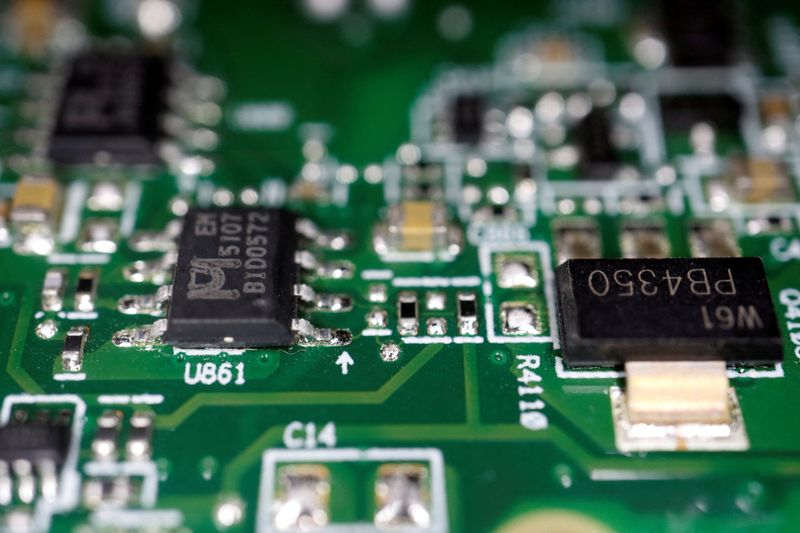By Karen Freifeld
NEW YORK (Reuters) – The U.S. government said on Monday it would further restrict artificial intelligence chip and technology exports, divvying up the world to keep advanced computing power in the U.S. and among its allies while finding more ways to block China’s access.
The new regulations will cap the number of AI chips that can be exported to most countries and allow unlimited access to U.S. AI technology for America’s closest allies, while also maintaining a block on exports to China, Russia, Iran and North Korea.
The lengthy new rules unveiled in the final days of outgoing President Joe Biden’s administration go beyond China and are aimed at helping the U.S. keep its dominant status in AI by controlling it around the world.
“The U.S. leads AI now – both AI development and AI chip design, and it’s critical that we keep it that way,” U.S. Commerce Secretary Gina Raimondo said.
The regulations cap a four-year Biden administration effort to hobble China’s access to advanced chips that can enhance its military capabilities and seek to maintain U.S. leadership in AI by closing loopholes and adding new guard rails to control the flow of chips and global development of AI.
While it is unclear how President-elect Donald Trump’s incoming administration will enforce the new rules, the two administrations share similar views on the competitive threat from China. The regulation is set to take effect 120 days from publication, giving the Trump administration time to weigh in.
New limits will be placed on advanced graphics processing units (GPUs), which are used to power data centers needed to train AI models. Most are made by Santa Clara, California-based Nvidia (NASDAQ:NVDA), while Advanced Micro Devices (NASDAQ:AMD) also sells AI chips.
Major cloud service providers, such as Microsoft (NASDAQ:MSFT), Google (NASDAQ:GOOGL) and Amazon (NASDAQ:AMZN), will be able to seek global authorizations to build data centers, a powerful part of the new rules that will exempt their projects from the country quotas on AI chips.
To obtain a stamp of approval, authorized companies must abide by stringent conditions and restrictions, including security requirements, reporting demands and a plan or track record of respecting human rights.
Until now, the Biden administration had imposed sweeping restrictions on China’s access to advanced chips and the equipment to produce them, updating the controls annually to tighten restrictions and capture countries at risk of diverting the technology to China.
NVIDIA FEARS ‘OVERREACH’
Because the rules alter the landscape for AI chips and data centers around the world, powerful industry voices criticized the plan even before it was published.
Nvidia on Monday called the rule “sweeping overreach” and said the White House would be clamping down on “technology that is already available in mainstream gaming PCs and consumer hardware.” Data center provider Oracle (NYSE:ORCL) argued earlier this month the rules would hand “most of the global AI and GPU market to our Chinese competitors.”
The rules impose worldwide licensing requirements on certain chips, with exceptions, and also set controls for what are known as “model weights” of the most advanced “closed-weight” AI models. Model weights help determine decision making in machine learning, and are generally the most valuable elements of an AI model.
The regulation divides the world into three tiers. About 18 countries, including Japan, Britain, South Korea and the Netherlands, will essentially be exempt from the rules. Some 120 other countries, including Singapore, Israel, Saudi Arabia and the United Arab Emirates will face country caps. And arms-embargoed countries like Russia, China and Iran will be barred from receiving the technology altogether.
In addition, U.S. headquartered providers likely to receive global authorizations such as AWS and Microsoft will be allowed to deploy only 50% of their total AI computing power outside the United States, no more than 25% outside of the Tier 1 countries, and no more than 7% in a single non-Tier 1 country.
AI has the potential to increase access to healthcare, education and food, among other benefits, but also can help develop biological and other weapons, support cyberattacks and assist with surveillance and other human rights abuses.
“The U.S. has to be prepared for rapid increases in AI’s capability in the coming years, which could have transformative impact on the economy and on our national security,” U.S. National Security Adviser Jake Sullivan said.

